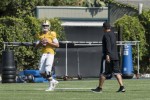UCLA’s struggles with penalties and run defense have been well documented over the past year. Flying under the radar has been the team’s inability to hold on to the football.
At the end of last season, UCLA finished dead last in the Pac-12 in just two statistical categories. One of them was penalties. The other? Time of possession.
The Bruins’ average time of possession in each game last year – 25 minutes and 56 seconds – was nearly 10 minutes less than that of Pac-12 leader Stanford.
Of course, this was no fluke or surprise, as UCLA’s offensive coordinator last year, Noel Mazzone, emphasized an up-tempo style. That was Mazzone’s modus operandi, and it likely will stay that way when he starts calling plays for Texas A&M this season.
But running an up-tempo scheme can certainly take its toll on a defense – especially a defense that’s already been decimated by injury. The Bruins lost a lot of depth from their defense last year, suffering season-ending injuries to three starters within the first month of the season.
With the injuries piling up, UCLA’s defense grew thin. There was one game – against Colorado – when the Bruins’ defense was so overworked in time of possession that they had to take redshirts off of certain players.
“Okay, I had to burn (sophomore linebacker Josh Woods’) redshirt,” said coach Jim Mora after the Colorado game. “We can’t play with 10 players.”
This lack of depth only exacerbated UCLA’s problems with run defense. Opponents started to run the ball – time and time again – to attack and wear down a Bruin defense that was already battling shortcomings.
Now, as the 2016 season approaches, the Bruins are trying to change their approach offensively. In a ploy to help the defense, new offensive coordinator Kennedy Polamalu and sophomore quarterback Josh Rosen are working to slow the tempo. It’s unlikely that the Bruins will be leading the Pac-12 in time of possession, but they will certainly not have the fastest-paced offense anymore.
“I think we’ll be able to be on the field longer and tire out their defense. And I think their offense will be on the field shorter – also tiring out their defense,” Rosen said. “(That) was an issue we had last year – we didn’t stay on the field for long enough, we didn’t give our defense a break. And hopefully we can do that and sort of reverse the cause and effect for this year.”
The change in tempo was noticeable in fall practice. There were fewer plays being run, the play clock was running down more often, and there were even a few delay of game penalties.
Rosen emerges as leader
In media interviews on Monday, three different UCLA players commended Rosen for his leadership and maturation as a quarterback.
“He’s more of a leader this year. Last year it was more of him just getting adjusted to college football,” said junior wide receiver Eldridge Massington. “This year he’s more vocal, he’s holding people more accountable this year and holding himself more accountable.”
One of those vocal moments from Rosen came during team meetings in fall camp. Rosen made a point to step up in front of the group and let his teammates know what his objectives are for this season.
“He really opened up and just said that he would do whatever it takes, (and) he’s willing to be there for anybody that needs help,” said redshirt senior quarterback Mike Fafaul. “I think everybody looks up to him.”
Aside from that, Rosen also took the responsibility, along with Massington, to organize offseason route-running workouts with the wide receivers.
“I think we’re starting to finally build a connection – more and more each day,” Massington said.
